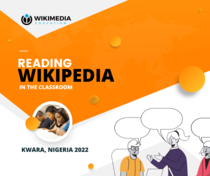Reading Wikipedia in the Classroom Nigeria
Program Goals
- Create awareness among 70 teachers on the effective usage of Wikipedia as a learning tool for retrieving, creating, and evaluating information before July 30th, 2022.
- The 70 teachers in Kwara enrolled in this program will understand, access, retrieve, and effectively integrate the lessons learned from this program into their classroom activities by July, 2022.
- By July 2022, at least 35 of these teachers will have received a certificate of completion showing they can implement new classroom strategies to foster media and information literacy using Wikipedia.

Prior to the pandemic, the Nigerian education system was centered entirely on face-to-face teaching and learning in primary and secondary schools. Most elementary and secondary school pupils were not permitted to own or be seen with a digital device like a phone or computer at school. With the emergence of school closures during the COVID-19 pandemic, both teachers and students were forced to quickly transition to remote learning, which was primarily focused on personalizing education by developing alternative learning models to facilitate high-quality learning and teaching efficiency. Despite the Federal Ministry of Education's educational policies prioritizing ICTs as 21st-century skills to advance remote learning in Nigeria secondary schools for high-quality teaching and learning, little or no stimulation is provided for prioritizing digital literacy and Open Education Resources to develop vital media and information literacy; understand how information is produced; and how students use information. This poses significant challenges for both students and teachers, who must develop a wide range of abilities in order to provide a safe and high-quality teaching-learning environment in the new normal. As a result, this project proposal will train Nigerian teachers to successfully use Wikipedia (and other Wikimedia products) to access, retrieve, interpret, and monitor the information consumed whilst developing Open Educational Resources (OERs) by adopting the UNESCO Media and Information Literacy Framework.